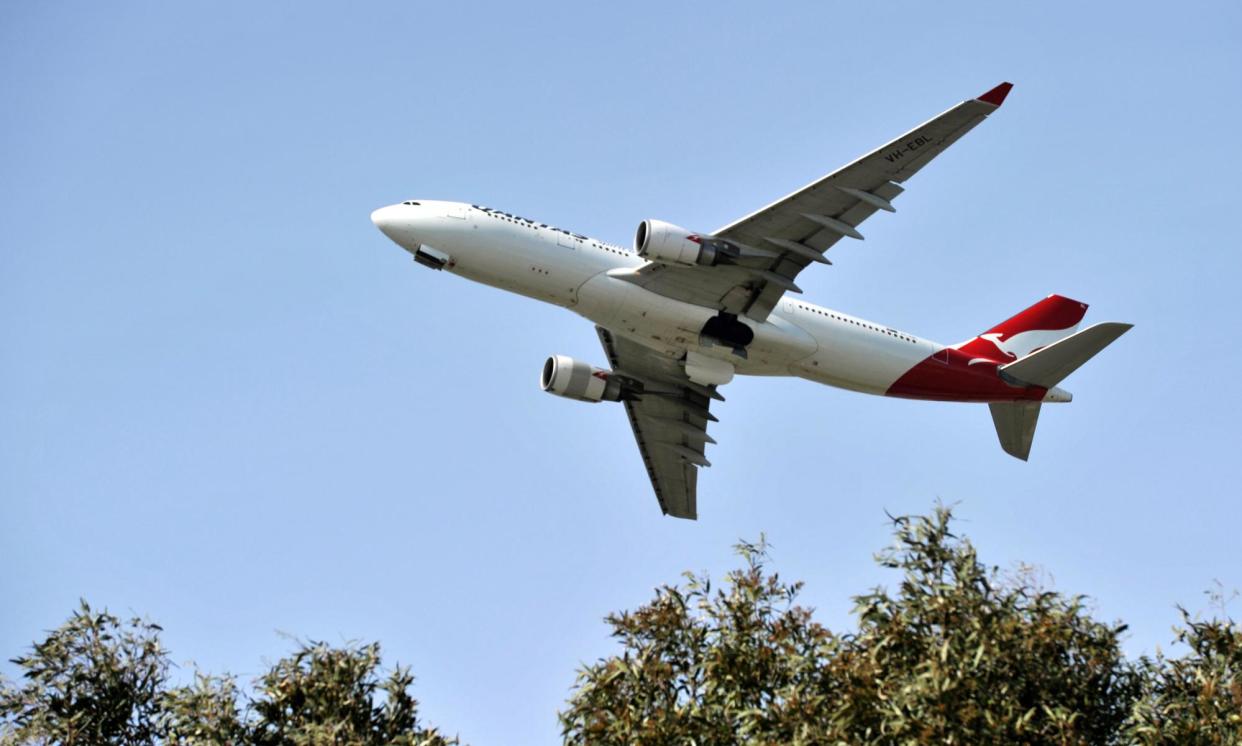New Australian aviation regulators will oversee airline ticket refunds and noise complaints

The flying public in Australia will gain improved rights to seek refunds and remedies from airlines while people living under flight paths will be able to complain to a new aircraft noise ombudsman.
On Monday the Albanese government released its aviation white paper and committed to 56 initiatives to improve fairness and accessibility at a time of dwindling competition.
A new aviation industry ombudsman will enforce a passenger rights charter, which could include cash compensation for cancelled or delayed flights.
The transport minister, Catherine King, told reporters in Canberra that an interim ombudsman in the transport department will start drafting the charter, but it would be up to the new ombudsman to recommend a European style compensation scheme for late flights.
In Europe, passengers whose flights arrive at their final destination with a delay of more than three hours are entitled to between €250 (A$485) and €600 (A$1,165), depending on the distance of the trip. In schemes overseas, longer delays mean passengers can opt to be fully refunded within seven days.
King added that the government hadn’t ruled out such a scheme but had to consider whether sweeping changes to compensation rules would be passed on to consumers as higher air fares.
The government also announced it would establish an aircraft noise ombudsman to conduct independent investigations into the handling of complaints by Airservices Australia, which would be stripped of that responsibility due to “potential for conflicts” that “can undermine public confidence”.
Related: New Australian aviation ombudsman could force airlines to pay cash compensation for delayed flights
King said aircraft noise has not been on Airservices Australia’s radar because safety is the predominant issue when setting flight paths.
The new ombudsperson gives Australians “confidence that it is not the same people who develop the flight path – who have actually been part of developing the flight path – [who are] also investigating complaints”, King said.
Airservices Australia will also collect more information on aircraft movements and noise effects, publishing quarterly reports on noncompliance with noise abatement procedures.
Pilots will be asked to fly “considerately” with new guidance on minimising noise in residential areas, a potent political issue in inner-city seats including three Brisbane electorates won by the Greens at the 2022 election.
The white paper notes difficulties with competition because airports are “natural monopolies” and overseas airlines show “minimal interest in establishing new Australian carriers” to compete with Virgin and Qantas.
The government will attempt to improve competition by reforming slot management at Sydney airport, opening competitive appointments to the role of slot manager to more effectively enforce slot rules and better handle conflicts of interest.
Sydney airport had been critical of the existing legislation which capped its operations, making access to its slots scarce and lucrative, amid allegations larger airlines have been misusing slots by scheduling flights they don’t intend to operate before strategically cancelling them to retain the access and block competitors.
The government has asked the Productivity Commission to inquire into the economic regulation of airports, considering further changes to slot rules such as a stricter “use it or lose it” rule and a limit on the period for which slots can be “grandfathered”.
Responding to the white paper, Sydney airport’s CEO, Scott Charlton, welcomed the measures but appeared eager for the Productivity Commission inquiry to tighten the “use it or lose it” rules for the airport.
Sydney airport has long argued the global standard, which allows airlines to retain a slot as long as they don’t cancel a service more than 20% of the time, is too lenient for a slot-constrained airport such as Sydney.
The Australian Competition and Consumer Commission already reviews pricing of domestic airlines, but could be asked to monitor pricing negotiations between airports and airlines in Sydney, Brisbane, Melbourne, Perth and western Sydney.
The opposition leader, Peter Dutton, told reporters in Brisbane that Labor had presided over the closure of Bonza and regional airline Rex being placed into administration. “Less competition means higher prices,” he said.
The shadow transport minister, Bridget McKenzie, blasted the white paper, claiming it “will do nothing to get planes running on time or secure the future of thousands of workers whose livelihoods are on the line”.
“Labor is kicking the issue of improved consumer protections for cancellations and delays down the road until after the next election,” McKenzie said, referring to the lack of commitment to a passenger compensation scheme which will now be determined through a consultation paper.
The Australian Airports Association (AAA) welcomed the consumer-focused measures in the white paper, but cautioned against reforms to their pricing models flagged by the Productivity Commission review.
“We’ll participate constructively in a review of the pricing model by the Productivity Commission and look forward to demonstrating how the current principles continue to work for airports, airlines and, most importantly, passengers,” AAA head of policy Natalie Heazlewood said.
Last year, King came under fire for the Albanese government’s decision to reject Qatar’s request to have greater rights to fly into major Australian airports.
On Monday, King emphasised her record including approving more flights for Turkish Airlines and signalled a further announcement on Tuesday increasing flights to Australia from Vietnam Airlines.


